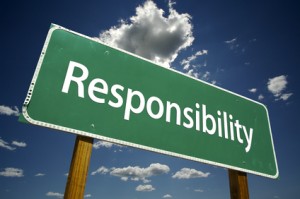Are You Taking Responsibility for Your Life, Really?
 Recently, while I was in Tennessee working with the Institute for Cultural Communicators, I watched a video series about taking responsibility for your life. Beforehand, I calculated that I was fairly responsible, at least above average, and that most things that went wrong in my life went wrong because of other people. That video changed my entire perception, and I want to share a little bit about that.
Recently, while I was in Tennessee working with the Institute for Cultural Communicators, I watched a video series about taking responsibility for your life. Beforehand, I calculated that I was fairly responsible, at least above average, and that most things that went wrong in my life went wrong because of other people. That video changed my entire perception, and I want to share a little bit about that.
One of the first things that I noticed when I watched the video was the way that the speaker posed particular question during the beginning. He asked, “Are you taking responsibility for your life, really?” Had he merely asked if I were taking responsibility for my life, I probably wouldn’t of given it much though, but the “really?” at the end caused me to do some introspection.
Whose fault was it that I was behind on my reading list? Whose fault was it that I hadn’t moved up the Institute for Cultural Communicator’s student leadership ladder in over a year? Whose fault was it that I, without fail, waited until the last minute to study before tests? The answer was simple. It was me.
The simple act of examining my life showed me that my assumptions were wrong. I was the cause of most of the frustration in my life, and the moment that I realized this, I resolved to be more responsible in the future. What I saw, though, was that people like to blame their problems on other things. Instead of taking responsibility for their inadequacies, they absolve themselves of any involvement.
Realizing that you aren’t owning up to your piece of the pie takes guts. It isn’t easy to admit your faults, but doing so is the first step to living responsibly. If you want to be a responsible person, you can start by recognizing your irresponsibility, as tough as that may be.
Another thing that caught my attention was a parable that he shared. The parable was from Matthew 25 and talks about a master who calls his servants and gives one servant five talents of gold, another two, and the last received one. The first servant went out and doubled his master’s money, the second also doubled what his master had given him, but the third servant had simply buried his gold in the ground.
When I first watched the video series, I didn’t quite get the meaning behind the parable, but I think that perhaps I have come to grasp at least some of it. At the end of the parable, the master rebukes the third servant and takes his one talent and gives it to the first servant. Although the third servant didn’t waste or lose his master’s money, he wasn’t responsible with it.
Of course, each of us, as human beings, hold specific skills – talents, in the non-monetary sense – and we need to be responsible with them. We can’t just possess them, we must use them. It is our duty to create something, to multiply what we have been given. We must take what our master has given and multiply it. We must learn, grow, work, and do hard things in order to do that, but it is what we are here to do.
So, there is just one final question. Are you taking responsibility for your life, really?
Discussion — No responses